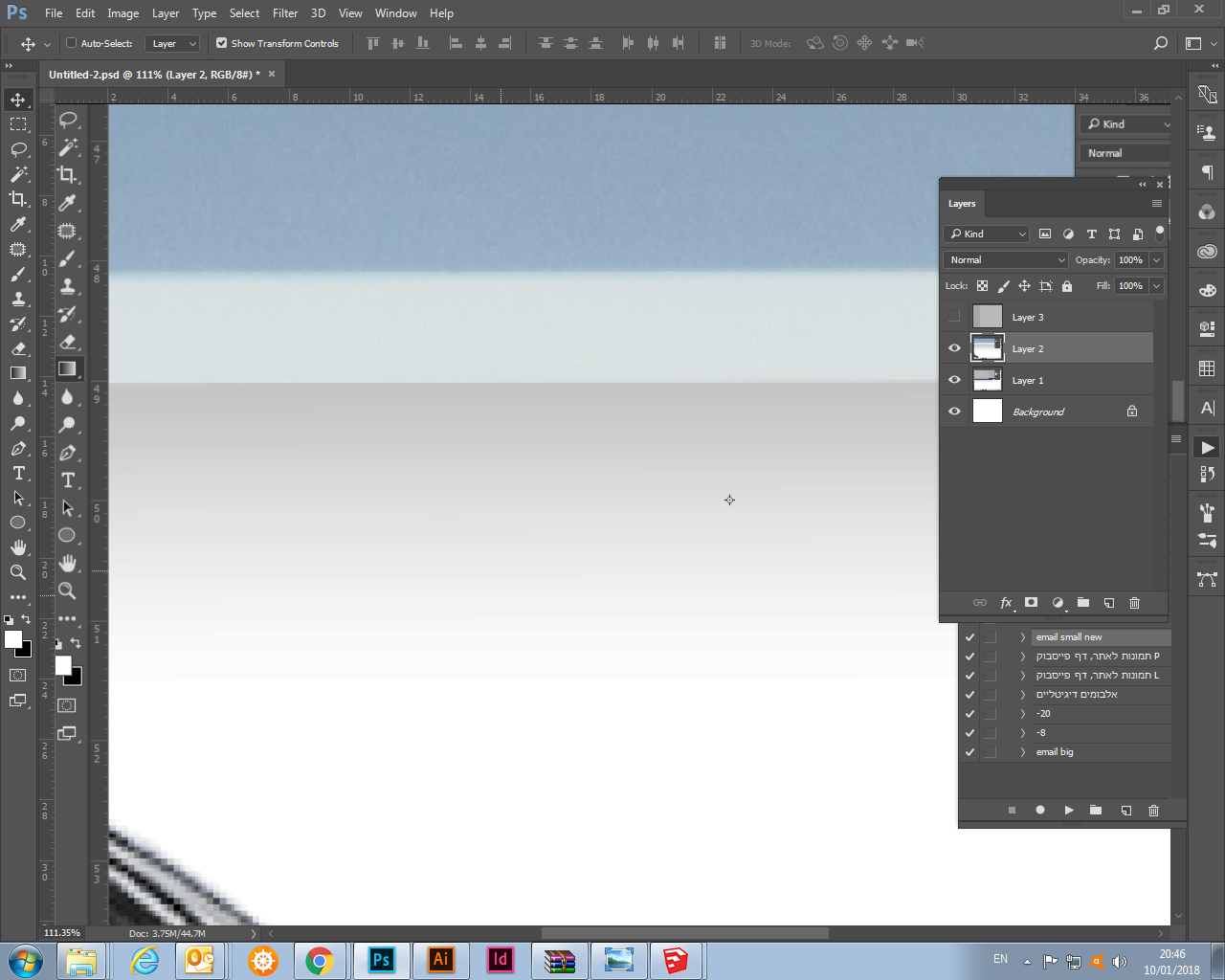shadow turns bad ...?
Copy link to clipboard
Copied
hi,
big problem - that started lately:
when i make shadow (by drop shadow, or blur) - it become "noisy" around the image...
it never happens to me before so i d'ont know what the problem is.
and it will be printed like that, so it is very bad...
see screen shut below.

, 
Explore related tutorials & articles
Copy link to clipboard
Copied
Hi
I am not sure what you mean by "noise". I do see gradient banding in your screenshot. If that is what you mean , switch to 16 bit mode and then add your shadow and see if the problem remains. You may still see some banding on screen (due to the limitations of an 8 bit display) but it should not be in your document in 16 bit. You can confirm whether the banding is in your document or display system if you run over the bands with the eyedropper tool.
Dave
Copy link to clipboard
Copied
it still doesn't help...
and i did not understand the way you check: "u can confirm whether the banding is in your document or display system if you run over the bands with the eyedropper tool"
- i opened the file 100% at Photoshop, and i know for a fact -that what you see is what you will get (in printing)... 😞
by the way -forgot to mention:
it is a pic that i attached at psd/png to an illustrator file, and export it to PDF. and the background is white (that's way you see every thing)
Copy link to clipboard
Copied
btride wrote
and i did not understand the way you check: "u can confirm whether the banding is in your document or display system if you run over the bands with the eyedropper tool"
Hi
Let me explain my comments.
We sometimes see banding on gradients due to the limited levels (i.e steps of brightness) available in 8 bits. There are only 256 steps from fully off black to fully on in each of the red , green and blue channels
This can be avoided by working in 16 bit which in theory gives 65536 levels (in Photoshop it actually uses 32769 levels). This increase in steps is more than enough to make the individual steps invisible. Note this will only work for gradients added in 16 bit. Just converting an 8 bit stepped gradient to 16 bit will keep those steps.*
When using 16 bit documents, the display system still operates at 8 bit. So a gradient may appear to be banded, when in actual fact it is not. If you switch the info panel to show 16 bit levels, then move slowly across the apparent banding, it should show constantly changing values - not the stepped changes you will see if the banding is in the document.
*The other way to hide banding in an existing gradient is to add a little noise to the picture (Filter >Add noise). Although it sounds counter-intuitive to add degradation to hide an artefact, it takes very little noise to hide the banding effects on a gradient and is often much preferable to the visible banding.
Dave
Copy link to clipboard
Copied
Thank you for your answer! J
You right, I just turned the file from 8 to 16 without making the shadow from the begging, I will try and get back to you (if it is ok).
I did not understand this part you wrote, please explain it again:
" When using 16 bit documents, the display system still operates at 8 bit. So a gradient may appear to be banded, when in actual fact it is not (but I can see it- and what I see at 100% will be printed). If you switch the info panel to show 16 bit levels, then move slowly across the apparent banding, it should show constantly changing values (it is! But I will see this noise, and not good as a regular blur, but in levels… L ) - not the stepped changes you will see if the banding is in the document." (?)
Copyright for the pictures and other materiel sending by the customers,
are at their responsibility, and theirs only.
This designer/studio is not responsible for any violating of any copyrights.
שמירה על זכויות יוצרים לתמונות, פונטים וחומרים שונים
ובכלל זה גריד קיים לביצוע העבודה המתקבלים ע"י הלקוח ו/או הלקוח המשני
הינה באחריות הלקוח בלבד, ואינה באחריות המעצבת/הסטודיו.
תיאור: logo_final_RGB_mail
[Personal data removed by moderator]
Copy link to clipboard
Copied
I did not understand this part you wrote, please explain it again:
A document has a bit depth which can be 8 bit or 16bits per channel (or 32 bits/channel for special purposes)
What you see on screen passes through the display system (i.e. your video card and monitor. Those most commonly work in 8 bits (high end equipment sometimes works in 10 bit).
Therefore when viewing you are looking at an 8 bit view - not the full 16 bits in the document.
Print drivers also vary - some are 8 bit some are 16 bit.
Dave
Copy link to clipboard
Copied
I don't know where you are at with this, or even if your drop shadow is made with layer effects, but if it is, there are at least two ways a drop shadow can appear noisy.
Setting the blend mode to Dissolve would be too obvious not to miss, but there is also a noise slider.

